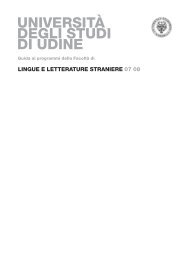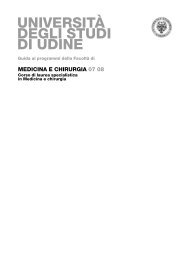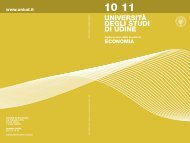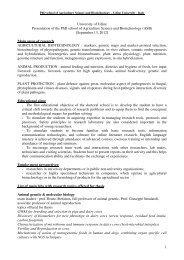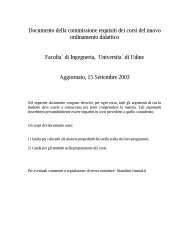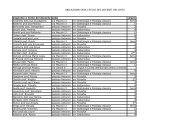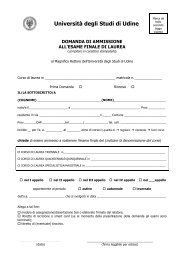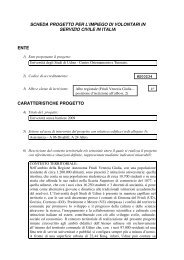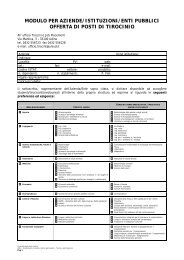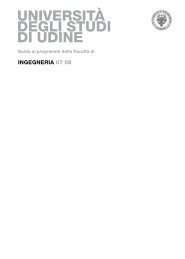â¢GUIDA ECONOMIA 07-08 - Università degli studi di Udine
â¢GUIDA ECONOMIA 07-08 - Università degli studi di Udine
â¢GUIDA ECONOMIA 07-08 - Università degli studi di Udine
Create successful ePaper yourself
Turn your PDF publications into a flip-book with our unique Google optimized e-Paper software.
prospectus u<strong>di</strong>ne<br />
239<br />
modernità: parlano i classici, Liguori,<br />
Napoli, 2004, (pages. 1-81).<br />
- A.R. CALABRO (ed.), Oggetto e metodo della<br />
sociologia: parlano i classici, Liguori,<br />
Napoli, 2003.<br />
- A. BAGNASCO, M. BARBAGLI, A. CAVALLI,<br />
Elementi <strong>di</strong> sociologia, Il Mulino, Bologna,<br />
2004 (from chapter I to chapter XI).<br />
- C. DE ROSE, Che cos’è la ricerca sociale,<br />
Carocci, Le bussole, Roma.<br />
Teaching arrangements<br />
This module, which awards 5 cre<strong>di</strong>ts, is<br />
made up of 16 two hour lectures. Supplementary<br />
practical lessons are foreseen.<br />
Exam<br />
There will be both a written and an oral<br />
exam. The written test (comprising both<br />
open and closed questions) will precede<br />
the oral test, which will be held a few days<br />
later.<br />
SOCIOLOGY 2<br />
Prof.ssa Laura Bergnach<br />
Contents<br />
The Sociology 2 course aims to introduce<br />
students to sociological analysis economics.<br />
A review of the classic authors will<br />
help students to <strong>di</strong>scover the main<br />
explanatory theories of relations between<br />
the economy and society, and will provide<br />
them with the fundamental concepts<br />
used by sociologists to analyse and understand<br />
the various organisations in economics,<br />
patterns of integration between<br />
the economy and society, and social factors<br />
related to economic development.<br />
Finally, this course will briefly illustrate<br />
the relationship between quantitative and<br />
qualitative research. The course is <strong>di</strong>vided<br />
into three parts:<br />
1. The institutional sphere ofeconomic relations:<br />
ways of producing and <strong>di</strong>stributing<br />
material resources. The first part of the<br />
course deals with the interpretative<br />
instruments used to study the various<br />
types of economy, relations between the<br />
State and the market in economic governance,<br />
the labour market, the evolution of<br />
industrial organisation, the development<br />
of the third sector, the new economy and<br />
the phenomenon of consumption.<br />
2. The relationship between the economy and<br />
society accor<strong>di</strong>ng to the principal tra<strong>di</strong>tional<br />
theories. In the second part, the course<br />
will illustrate the most important formulations<br />
of the relationship between the<br />
economy and-society, with particular reference<br />
to the following classic authors:<br />
Marx, Weber, Simmel, Sombart,<br />
Durkheim, Veblen, Schumpeter, Polanyi.<br />
3. Methodology and research techniques.<br />
The third part of the course aims to<br />
briefly illustrate the thought matrix<br />
belonging to the two fundamental qualitative<br />
and quantitative para<strong>di</strong>gms of<br />
social research and their empirical applications.<br />
In ad<strong>di</strong>tion, there will be a short<br />
explanation of the procedures and stages<br />
of qualitative research techniques: <strong>di</strong>rect<br />
examination, the qualitative interview,<br />
the use of documents.<br />
Bibliography<br />
- A. BAGNASCO, M. BARBAGLI, A. CAVALLI,<br />
Sociologia, volume 3, Organizzazione<br />
sociale, popolazione e territorio, Il Mulino,<br />
Bologna, 2001, first part (chapters 1, 2, 3).<br />
- P. CORBETTA, La ricerca sociale: metodologia<br />
e tecniche, volume 3, Le tecniche qualitative,<br />
Il Mulino, Bologna, 2003.<br />
- C. TRIGILIA, Sociologia economica, volume<br />
1, Profilo storico, Il Mulino, 2002.<br />
Teaching arrangements<br />
This module, which awards 5 cre<strong>di</strong>ts, is<br />
made up of 16 two hour lectures. Supplementary<br />
practical lessons are foreseen. In<br />
order to pass the examination, students<br />
should be able to show a good knowledge<br />
of the subject and the main terms. There-



